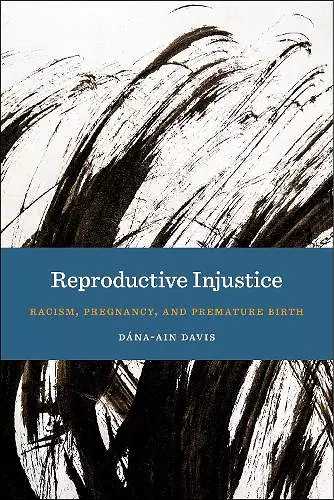Reproductive Injustice
Racism, Pregnancy, and Premature Birth
Format:Paperback
Publisher:New York University Press
Published:25th Jun '19
Should be back in stock very soon
This paperback is available in another edition too:
- Hardback£77.00(9781479812271)

Winner, 2020 Senior Book Prize, given by the Association of Feminist Anthropology
Winner, 2020 Eileen Basker Memorial Prize, given by the Society for Medical Anthropology
Honorable Mention, 2020 Victor Turner Prize in Ethnographic Writing, given by the Society for Humanistic Anthropology
Finalist, 2020 PROSE Award in the Sociology, Anthropology and Criminology category, given by the Association of American Publishers
A troubling study of the role that medical racism plays in the lives of Black women who have given birth to premature and low birth weight infants
Black women have higher rates of premature birth than other women in America. This cannot be simply explained by economic factors, with poorer women lacking resources or access to care. Even professional, middle-class Black women are at a much higher risk of premature birth than low-income white women in the United States. Dána-Ain Davis looks into this phenomenon, placing racial differences in birth outcomes into a historical context, revealing that ideas about reproduction and race today have been influenced by the legacy of ideas which developed during the era of slavery.
While poor and low-income Black women are often the “mascots” of premature birth outcomes, this book focuses on professional Black women, who are just as likely to give birth prematurely. Drawing on an impressive array of interviews with nearly fifty mothers, fathers, neonatologists, nurses, midwives, and reproductive justice advocates, Dána-Ain Davis argues that events leading up to an infant’s arrival in a neonatal intensive care unit (NICU), and the parents’ experiences while they are in the NICU, reveal subtle but pernicious forms of racism that confound the perceived class dynamics that are frequently understood to be a central factor of premature birth.
The book argues not only that medical racism persists and must be considered when examining adverse outcomes—as well as upsetting experiences for parents—but also that NICUs and life-saving technologies should not be the only strategies for improving the outcomes for Black pregnant women and their babies. Davis makes the case for other avenues, such as community-based birthing projects, doulas, and midwives, that support women during pregnancy and labor are just as important and effective in avoiding premature births and mortality.
"Davis explores how medical racism impacts black women... The work is unique in that it is the first to focus on the subject as it relates to professional working women and provides evidence that black women across all classes still have a higher rate of premature births than other women." * Library Journal *
"As a white NICU nurse, I came to read Reproductive Injustice because I suspected I was participating in medical racism, but had never learned the relevant history to identify how, or critical race theory to know what to do about it. Reading Dr. Davis’ work, it was devastatingly easy for me to see how current practices in my NICU workplace reflected racist ideologies born from American slavery. As the work repeatedly ‘[reiterates] racism’s grammar,’ Reproductive Injustice gave me the vocabulary to begin to challenge it." * Words of Choice *
"Reproductive Injustice provides a powerful look at the disturbing and lingering disparity in premature births occurring among black women... Davis presents a deterritorialized ethnography that covers time and space: her fieldwork with mothers, birth workers, and hospital staff illuminates a rich narrative encompassing black women’s reproduction, the history of the March of Dimes, and development of the neonatal intensive care unit. A must read for students of anthropology, sociology, and medicine, particularly practitioners working with pregnancy and childbirth." * Choice *
"Davis brings context to the large-scale statistics and inferences that are built of individuals’ stories. Part of the afterlife of slavery has been the tendency to explain away statistics by singling out black women and blaming their individual behaviors, treating each woman in isolation rather than pointing to systemic inequities and toxic stress and their effects on health. Telling multiple individuals’ stories in aggregate works against this tendency; it creates a picture of structural racism … [and] paints an alarming picture of how medical racism affects black women’s health and black infant prematurity." * Christian Century *
"As anthropologists, we should hope that Reproductive Injustice finds audiences outside of the academy, as it is an excellent example of the continuing relevance of the discipline, generally—and ethnography, specifically—in contemporary conversations about race in the United States." * Medical Anthropology Quarterly *
"What makes Davis’ timely contribution in Reproductive Injustice especially powerful is her careful and well-documented insistence that we must understand the racial disparities in birth outcomes—and in particular, higher rates of premature birth among Black women—as a product of structural racism and its numerous manifestations in medicine and everyday life." * Social Force *
"Reproductive Injustice [...] highlights the troubling role medical racism plays regarding Black women who have given birth to premature and low weight infants, as well as their families." * Journal of African American History *
"[An] essential reading for social workers and anyone interested in understanding health disparities [...] A call to action to medical providers, social workers, and those involved in health disparities research, practice, and/or advocacy." * Journal of Women and Social Work *
ISBN: 9781479853571
Dimensions: unknown
Weight: 458g
272 pages